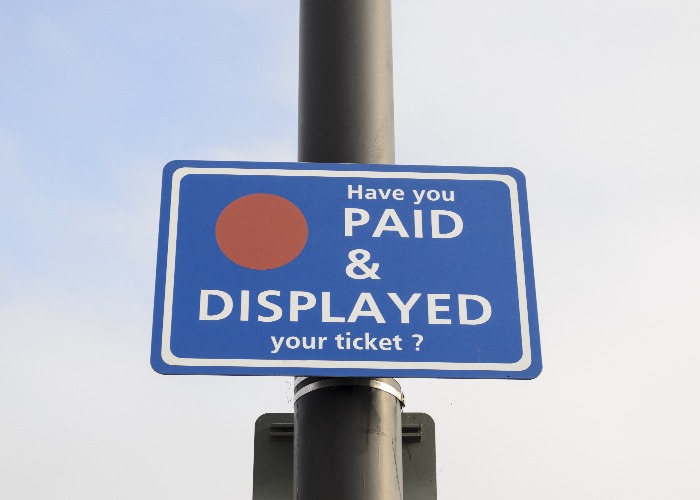Hospitals in England 'make £344 million from parking charges'

New research suggests patients and visitors face big fees and fines for parking at hospitals in England.
Hospitals in England have raked in more than £344 million from parking charges since 2013 — or nearly £115 million a year — according to an investigation by Auto Express.
The research found that each NHS Foundation Trust in England made an average of £949,000 a year in parking fees from patients and visitors.
The analysis uncovered that fees could differ dramatically between hospitals. Some were found to charge up to £3.50, while others charged as little as 60p on their standard daily tariff.
The Freedom of Information request also revealed trusts have issued a whopping 275,000 fines worth £2.8 million in the last three years. This amounts to annual income of £8,200 from penalty charges for each of the trusts in England.
The 10 highest earning hospital trusts
Here are the top 10 highest earning hospital trusts for parking income between 2013 and 2016 according to the research.
|
NHS Foundation Trust |
Total parking income 2013-2016 |
|
Derby Teaching Hospitals NHS Foundation Trust |
£10,858,298 |
|
Heart of England NHS Foundation Trust |
£10,333,980 |
|
Nottingham University Hospitals NHS Trust |
£9,859,187 |
|
Sheffield Teaching Hospitals NHS Foundation Trust |
£9,391,935 |
|
Central Manchester NHS Foundation Trust |
£8,940,052 |
|
The Pennine Acute Hospitals NHS Trust |
£7,813,559 |
|
Frimley Health NHS Foundation Trust |
£7,417,537 |
|
Worcestershire Acute Hospitals NHS Trust |
£6,982,463 |
|
The University Hospitals of Leicester NHS Trust |
£6,933,404 |
|
South Tees Hospitals NHS Foundation Trust |
£6,544,045 |
Source: Auto Express
As you can see Derby Teaching Hospital NHS Foundation Trust was the biggest earner from hospital parking charges, collecting £10.8 million since 2013.
A spokesman for the trust told Auto Express the majority of the money collected from parking charges is spent on car park maintenance and added: “Any revenue remaining is reinvested into caring for our patients.”
Auto Express found Derby Teaching Hospital NHS Foundation Trust wasn’t alone though, with a quarter of hospitals diverting the money received into car park maintenance rather than putting it towards patient care.
Here are the top 10 highest earning hospital trusts for income from parking fines between 2013 and 2016.
|
NHS Foundation Trust |
Total income from parking fines 2013-2016 |
|
The Leeds Teaching Hospitals NHS Trust |
£245,422 |
|
London North West Healthcare NHS Trust |
£149,903 |
|
Warrington and Halton Hospitals NHS Foundation Trust |
£146,940 |
|
University Hospitals Bristol NHS Foundation Trust |
£134,152 |
|
East Kent Hospitals University NHS Foundation Trust |
£126,757 |
|
Cambridge University Hospitals NHS Foundation Trust |
£121,207 |
|
Ipswich Hospital NHS Trust |
£105,803 |
|
Bolton NHS Foundation Trust |
£95,000 |
|
West Hertfordshire Hospitals NHS Trust |
£83,466 |
|
Royal Devon & Exeter NHS Foundation Trust |
£83,034 |
Source: Auto Express
As you can see The Leeds Teaching Hospitals NHS Trust made the most from fines issued to visitors and patients that have fallen foul of the rules since 2013, with more than £245,000 raised.
‘Tax on the ill’
Katherine Murphy, chief executive of the Patients Association, told Auto Express: “This is a tax on the ill. Going to hospital can be stressful and patients do not need further stress by having to worry about the cost of parking or about any fines they may incur.”
The Department of Health said that over half of NHS hospitals offer free parking, but on closer inspection this is usually only for up to 30 minutes. Only four trusts in England don’t charge for parking.
The Government recommends free, or reduced fees, for the disabled, frequent outpatients or visitors with gravely ill relatives.
But Auto Express found that 14% of trusts don’t offer any concessions to Blue Badge holders or long-term and terminally ill patients.
Should the charges be scrapped?
There have long been calls for England to follow the lead of Scotland and Wales in scrapping these hated charges.
Wales introduced free hospital parking in April 2008.
Scotland followed suit at the end of 2008 by scrapping hospital parking charges for patients, visitors and staff at 14 hospitals, leaving only three that charge fees.
But moves to scrap the charges in England have been less successful and have been blocked by Parliament. However, last year the British Parking Association (BPA) worked with the NHS to revise its parking guidelines.
A BPA spokeswoman said: “Whilst many people attending healthcare facilities expect car parking to be free, the limits on space, costs involved and demand for spaces mean that parking needs to be managed. Often the most effective way to do this is by charging.
“Free parking at hospitals in Wales and Scotland has actually made the situation worse. If the users don’t pay for the parking then the trust does.”
Beat rubbish saving rates. Find out how to earn 5% from a current account instead!
Don’t miss these:
Crash for cash: the hotspots, trends and victims of this terrible fraud
Speeding fine postcode lottery: will your ticket be overturned?
Comments
Be the first to comment
Do you want to comment on this article? You need to be signed in for this feature